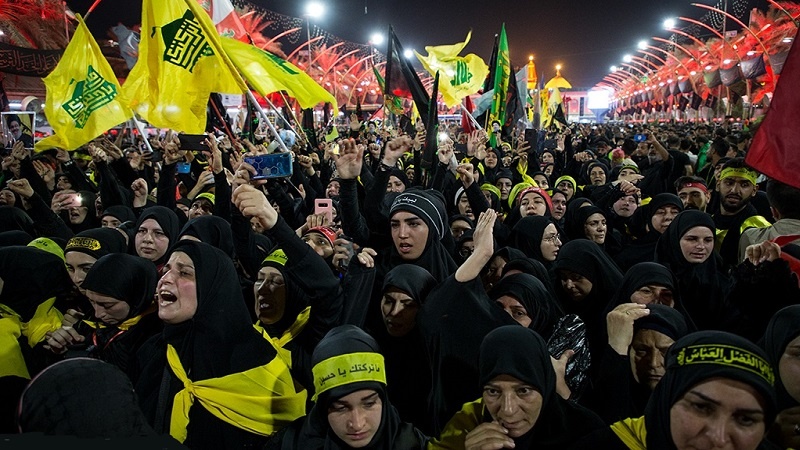Arba'een walk 2019: World's largest gathering in numbers
This year's Arba'een walk was the largest to date, with some 21 million in attendance between October 4 and 19. Of that number, 17 million people were Iraqi citizens, a whopping 40 percent of the country's population.
That's also 75 percent of the Arab country's Shia Muslims in total. Also, around 3.5 million Iranian pilgrims travelled to Iraq over the past few days to take part in this year’s Arba’een processions. On Saturday Oct. 19, the Day of Arba'een, more than 15 million people converged on the holy city of Karbala. Despite the global attention that it has received and its sheer size, however, most Western media adamantly give the Arba'een gathering as little coverage as possible.
The following is an informative news report in this regard by staff writers of website of Iran's English language TV network, Press TV, under the heading: "Arba'een walk 2019: World's largest gathering in numbers."
Millions of people from around the world travel to Iraq each year to partake in the annual Arba'een processions, which over the past years have grown into the largest human gathering of any kind.
The event marks the 40th day after the anniversary of the martyrdom of the third Shias' Imam, Hussein ibn Ali (PBUH) and 72 of his loyal companions in the Battle of Karbala, in southern Iraq, in 680 AD after fighting courageously for justice against the much larger and tyrant army of the Umayyad Caliph, Yazid I.
Each year, to mourn their third Imam, Muslims set off on a symbolic 80-kilometer walk that begins from the Iraqi holy city of Najaf, where the holy shrine of his father Imam Ali (PBUH) is located, to the holy city of Karbala, where Imam Hussein's holy shrine is located.
Accommodating the pilgrims along the road, as well as in both Najaf and Karbala, are thousands of make-shift tents, also known as Mawkibs, that provide a wide range of services from food to medical care and massages -- all free of charge.
The event has over the past few years attracted global attention following the emergence of the Daesh terrorist group, which sought to raze all historically and religiously significant sites in Iraq and Syria under the influence of their Takfiri-Wahhabist ideology.
Despite the global attention that it has received and its sheer size, however, most Western media adamantly give the Arba'een gathering as little coverage as possible.
Unofficial sources suggest that this year's Arba'een walk was the largest to date, with some 21 million in attendance between October 4 and 19.
Of that number, 17 million people were Iraqi citizens, a whopping 40 percent of the country's population. That's also 75 percent of the Arab country's Shia Muslims in total.
Also, around 3.5 million Iranian pilgrims travelled to Iraq over the past few days to take part in this year’s Arba’een processions.
On Saturday, the day of Arba'een, more than 15 million people converged on the holy city of Karbala.
Overall, people from more than 70 countries took part in this year's Arba'een. Iranian pilgrims used several border crossings with the neighboring Iraq to take part in the event.
Pakistan had the third largest number of pilgrims at 500,000. People from India, Azerbaijan, Turkey, Afghanistan, Lebanon, Kuwait, Bahrain and Saudi Arabia also attended in high numbers.
The Arba'een walk of this year was also unique in that it had 500 different starting points from various cities and villages across Iraq. This is unmatched by any other rally in the world.
This year's Arba'een walk also covered more than 2,000 kilometers of roads across Iraq, forming the largest ever rally trail in history.
More than 100,000 Mawkibs, rest places and mosques formed the world's largest network to serve this year's Arba'een pilgrims, providing them with food, water, long-distance phone calls, personal hygiene, medical services and security.
The organizers, who were mainly comprised of Iraqi citizens as well as nationals of other countries, dished out some 125 millions of meals, 150 million liters of water and more than 500,000 tonnes of fruits and vegetables. That's an average of some 8 million meals a day for 15 straight days.
More than 600,000 medical doctors, engineers, chefs, construction workers, drivers, translators and religious scholars from around the world volunteered to serve Arba'een pilgrims completely free of charge.
Thousands of Imam Hussein's devotees among Sunni Muslims, Christians and Mandaeans also took part in this year's Arba'een walk.
Overall, people donated more than $500 million to this year's processions, more than $100 million of that was funded by the people of the holy city of Najaf.
The donations ranged from 250 Iraqi dinars (20 cents) to 650 million Iraqi dinars ($500,000). Security was jointly provided by the Iraqi army and police. The pro-government Popular Mobilization Units (PMU), or Hashd al-Sha'abi, also contributed to ensuring security.
Meanwhile, President Hassan Rouhani voiced his administration’s determination to facilitate travels to Iraq during the Arba’een season in the coming years. Speaking at a cabinet session on Sunday Oct. 20, Rouhani said the number of Iranians who attended this year’s Arba’een processions in Iraq was 14 times higher than those during the previous administrations. Highlighting his administration’s success in signing an agreement with Iraq on the removal of visa restrictions for Arba’een pilgrims, the president said he will keep trying to further facilitate the Arba’een pilgrimage to Iraq in the years to come. He also praised the Iranian people and officials for holding the Arba’een mourning ceremonies in a secure atmosphere with suitable services.
Moreover, President Rouhani applauded the Iraqi people and officials for their hospitality and efforts to ensure security of pilgrims visiting Iraq during the Arba’een season. In a message to Iraq’s President Barham Salih and Prime Minister Adil Abdul-Mahdi on Sunday Oct. 20, the Iranian president expressed his sincere gratitude to the Iraqi officials, clerics and religious authorities who spared no effort to provide security for the Arba’een pilgrims and offered warm hospitality.
He also hailed the Arba’een processions as a manifestation of solidarity and proximity between people of Iran and Iraq and a testimony to the formation of a united front against injustice, discrimination and violence. President Rouhani added the huge congregation proved that Arba’een is not just an event in the calendar, but a lasting and historic miracle and an immense media for presenting the culture of Ashura. The president also paid tribute to the pious and giving people of Iraq who generously hosted millions of pilgrims from Iran and other countries during the Arba’een season.
ME

